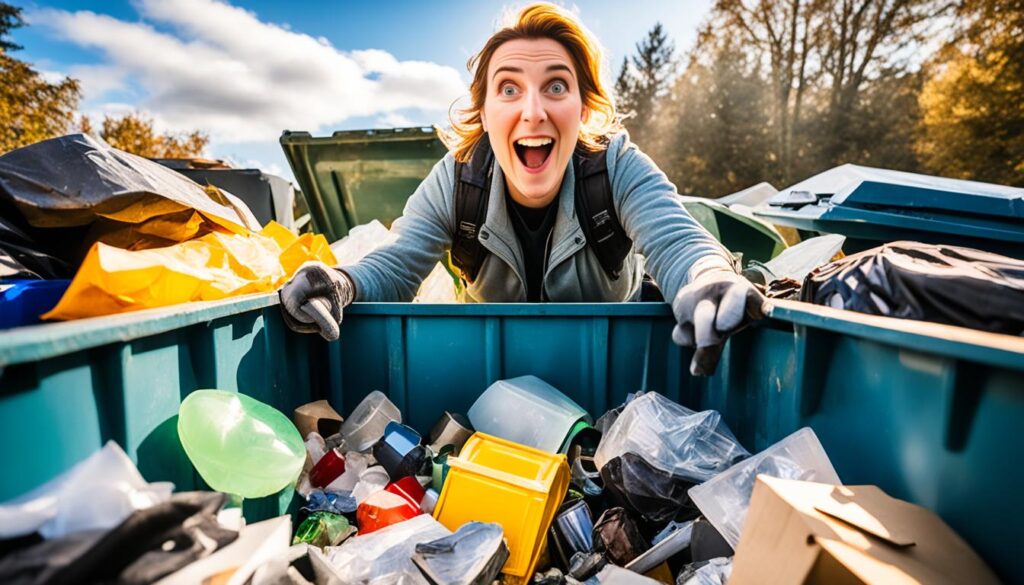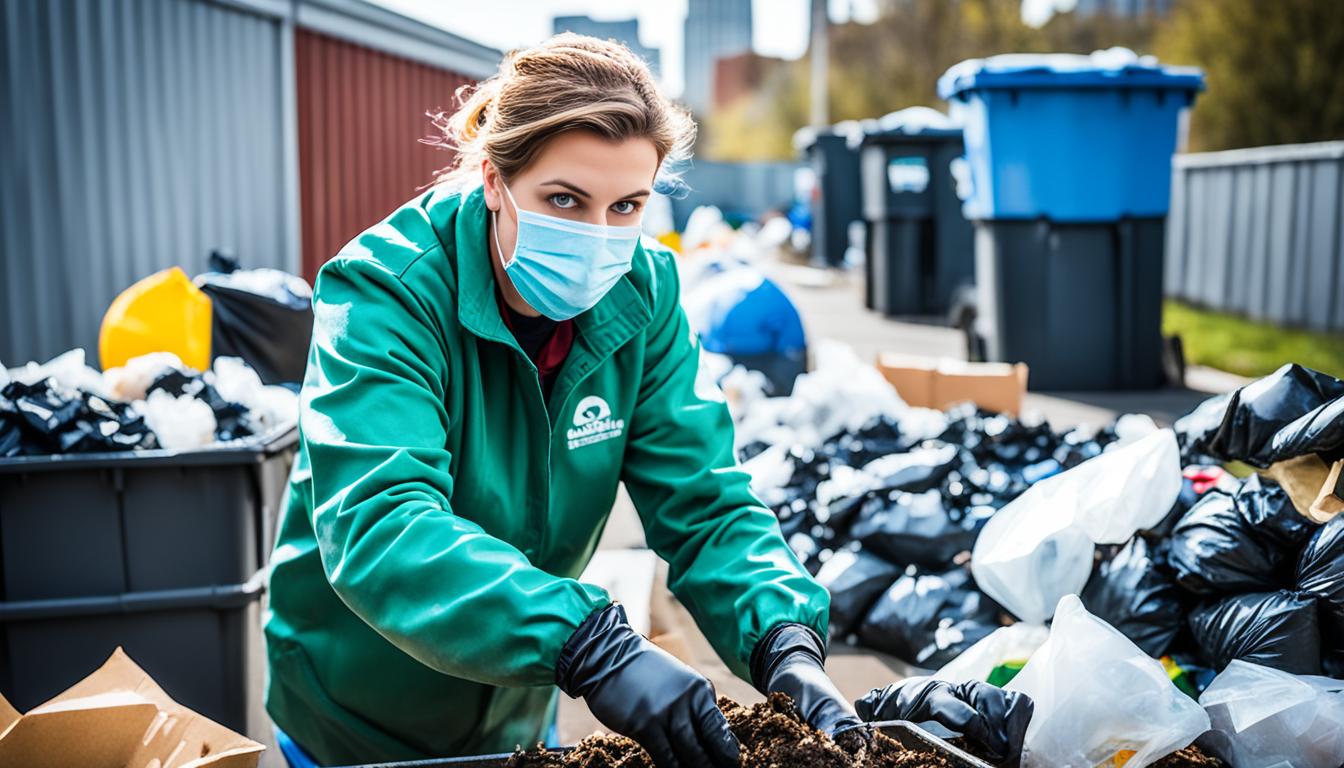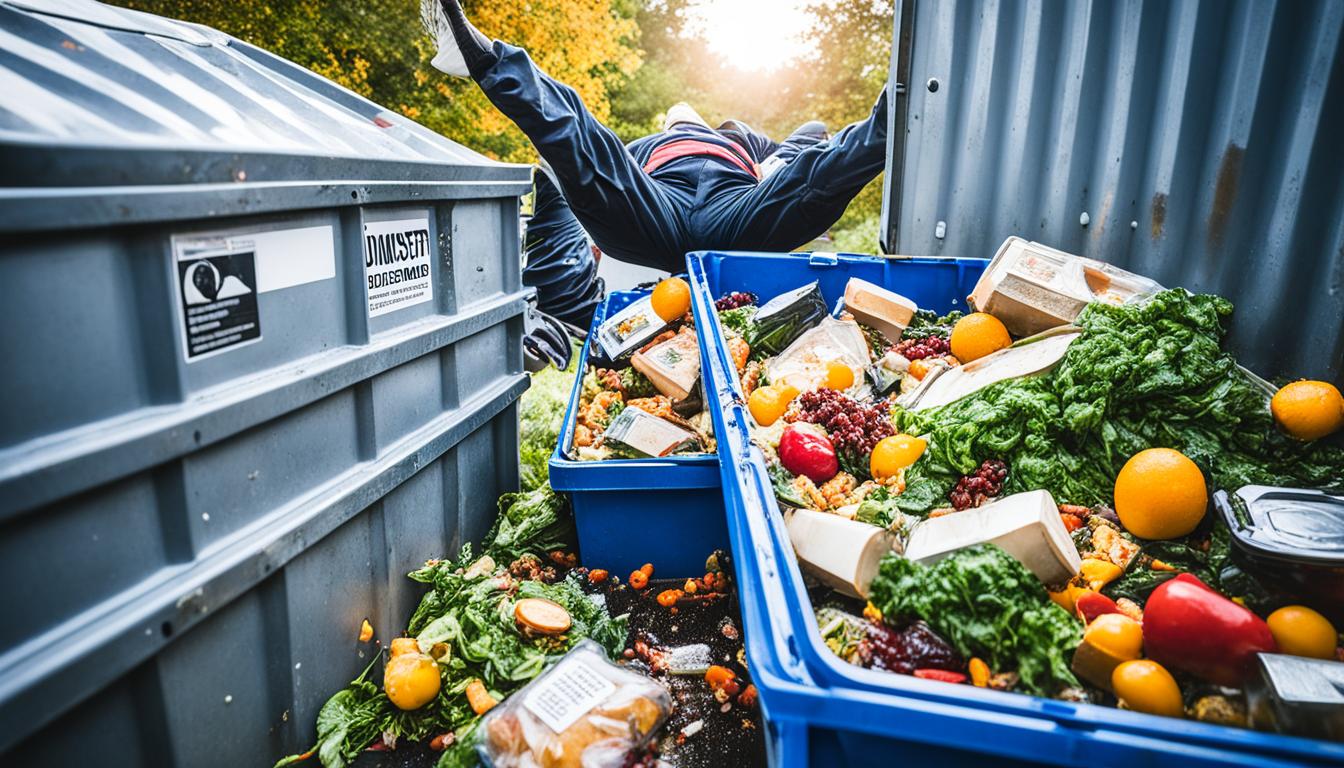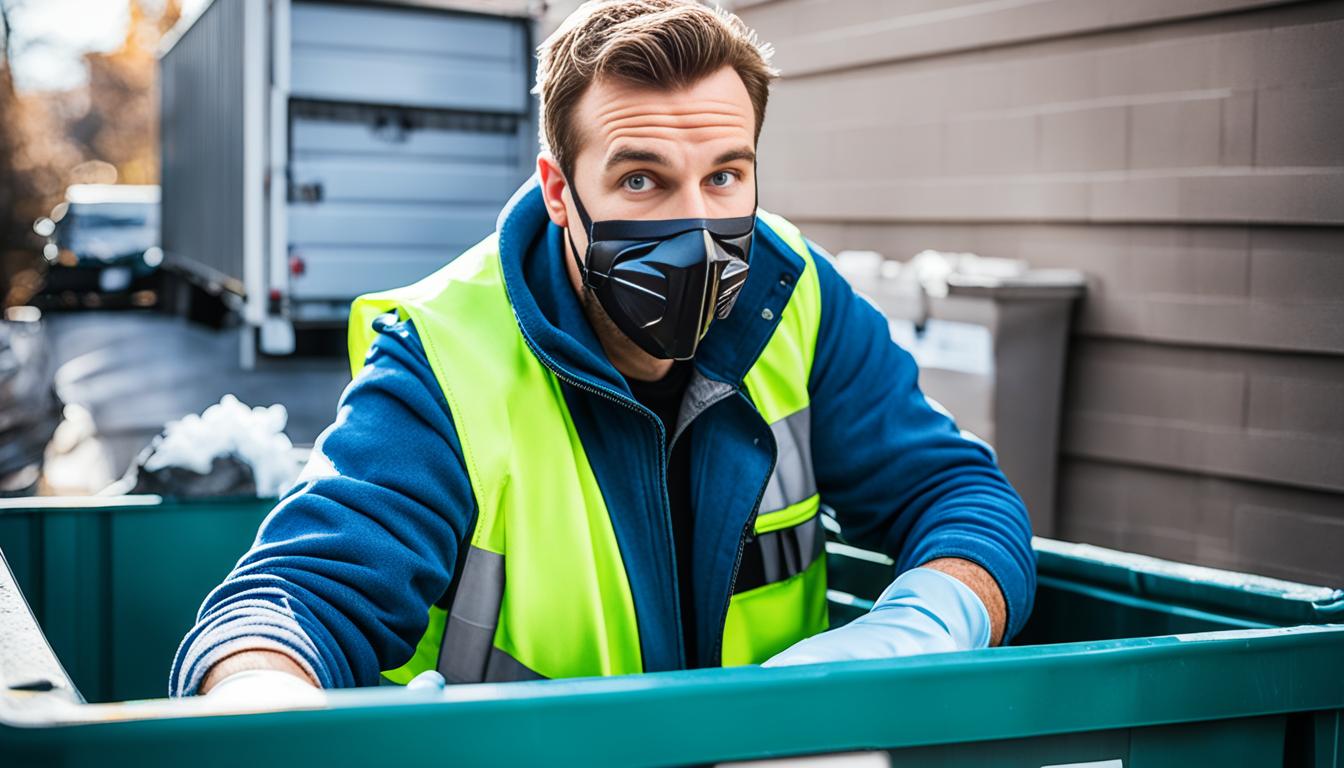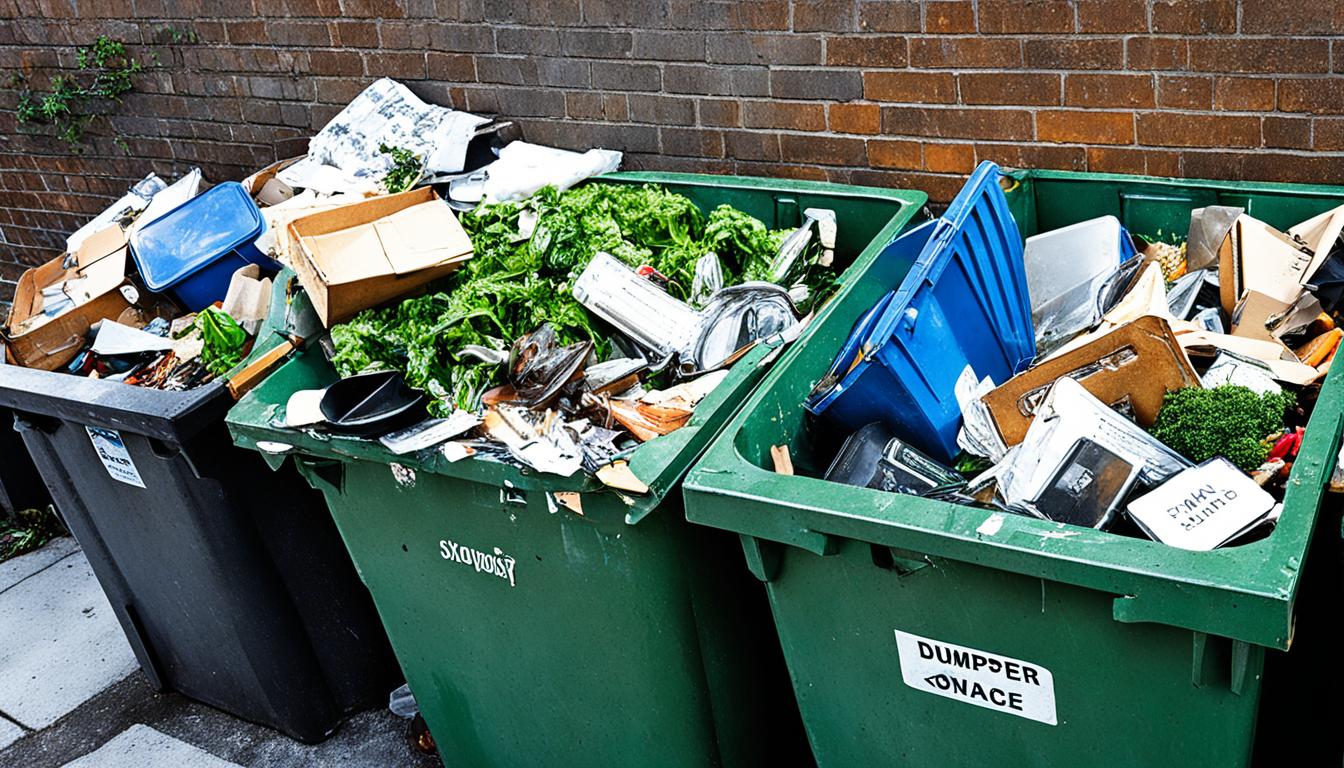Disclosure: This Post Contains Affiliate Links; We earn a commission on purchases.
When it comes to waste reduction strategies and sustainable practices, dumpster diving may not be the first thing that comes to mind. However, this unconventional practice actually plays a crucial role in minimizing our environmental impact and promoting a more sustainable future.
While the term “dumpster diving” may conjure up images of rummaging through trash bins, it’s important to understand the positive impact it can have on our planet. By salvaging usable items and food from dumpsters, dumpster divers actively contribute to waste reduction and help alleviate the burden on our already overflowing landfills.
Key Takeaways:
- Dumpster diving is a practice that involves searching through dumpsters for usable items or food.
- It contributes to waste reduction by rescuing items that would otherwise end up in landfills.
- Dumpster diving helps lower the levels of land pollution and reduces the amount of plastic waste entering the environment.
- This practice can also contribute to hunger reduction by rescuing edible food from grocery stores and retailers.
- While dumpster diving is generally legal, it’s important to be aware of local regulations and avoid trespassing or causing disturbances.
What is Dumpster Diving?
Dumpster diving is the act of searching through dumpsters and trash bins to find usable items, particularly food and clothing. It is often done by individuals facing financial challenges who struggle to meet their basic needs. The main principles of dumpster diving revolve around the 3 Rs: reuse, reduce, and recycle. By salvaging items from the garbage, dumpster divers contribute to waste reduction and promote the reuse of materials.
Dumpster diving is not just about finding discarded items; it’s a way to make a positive impact on the environment and society. Let’s dive deeper into the concept of dumpster diving.
The Three Rs of Dumpster Diving: Reuse, Reduce, and Recycle
When engaging in dumpster diving, individuals embody the principles of the 3 Rs, which are:
- Reuse: Dumpster divers aim to find items that can be reused or repurposed. Instead of throwing away objects that still have life in them, dumpster diving allows these items to find a second home and purpose.
- Reduce: By salvaging items from the trash, dumpster divers contribute to waste reduction. This practice helps divert usable goods from ending up in landfills, ultimately reducing the overall volume of waste produced.
- Recycle: Dumpster diving extends to recycling efforts as well. Divers often come across materials that are recyclable, such as plastics or metals. By properly recycling these materials, they help ensure that resources are reused efficiently and sustainably.
Through the principles of reuse, reduce, and recycle, dumpster divers play an active role in waste reduction and promote a circular economy where resources are efficiently utilized and preserved.
“Dumpster diving is not just about finding discarded items; it’s a way to make a positive impact on the environment and society.”
By embracing dumpster diving, individuals can actively contribute to waste reduction and promote sustainable practices. In the next section, we will explore why dumpster diving is beneficial for the environment.
| Benefits of Dumpster Diving | Explanation |
|---|---|
| Waste Reduction | Dumpster diving helps divert usable items from ending up in landfills, reducing the overall volume of waste produced. |
| Promotion of Reuse | By salvaging items and giving them a second life, dumpster divers contribute to the reuse of materials, reducing the need for new production. |
| Resource Conservation | By recycling materials found through dumpster diving, resources are conserved and utilized efficiently instead of being wasted. |
| Mitigation of Hunger | Rescuing discarded food from dumpsters can help alleviate hunger by providing nutritious meals to those in need. |
Why is Dumpster Diving Good for the Environment?
Dumpster diving offers numerous environmental benefits that contribute to waste reduction, land pollution mitigation, plastic waste reduction, and hunger alleviation. By salvaging items that would otherwise end up in landfills, dumpster diving plays a crucial role in reducing waste and promoting sustainable practices.
One of the primary advantages of dumpster diving is its significant impact on waste reduction. By rescuing usable items from dumpsters, this practice prevents them from occupying landfill space unnecessarily. When items are diverted from landfills, the overall waste volume decreases, leading to a decreased environmental impact and a more efficient use of resources.
Dumpster diving is an effective way to combat land pollution. By rescuing discarded items, dumpster divers contribute to lower levels of land pollution caused by the buildup of waste in landfills. This practice helps maintain cleaner and healthier environments by reducing the amount of waste that decomposes and releases harmful substances into the soil and groundwater.
“Dumpster diving plays a crucial role in waste reduction, land pollution mitigation, plastic waste reduction, and hunger alleviation.”
Plastic waste reduction is another significant benefit of dumpster diving. By salvaging discarded items made of plastic, such as containers, packaging materials, and household items, divers contribute to a reduction in plastic waste that would otherwise end up in landfills or natural environments, posing serious threats to wildlife and ecosystems.
Furthermore, dumpster diving can also contribute to the reduction of hunger levels by rescuing discarded food from grocery stores and retailers. Food waste is a significant issue globally, and dumpster diving provides an opportunity to address this problem by redistributing edible items to those in need. By rescuing and redistributing food, dumpster divers can help alleviate poverty and food insecurity in their communities.
Overall, dumpster diving is a valuable practice that not only reduces waste and tackles land pollution but also contributes to plastic waste reduction and hunger alleviation. By salvaging usable items and rescuing discarded food, dumpster divers play an active role in promoting environmental conservation and sustainable practices.
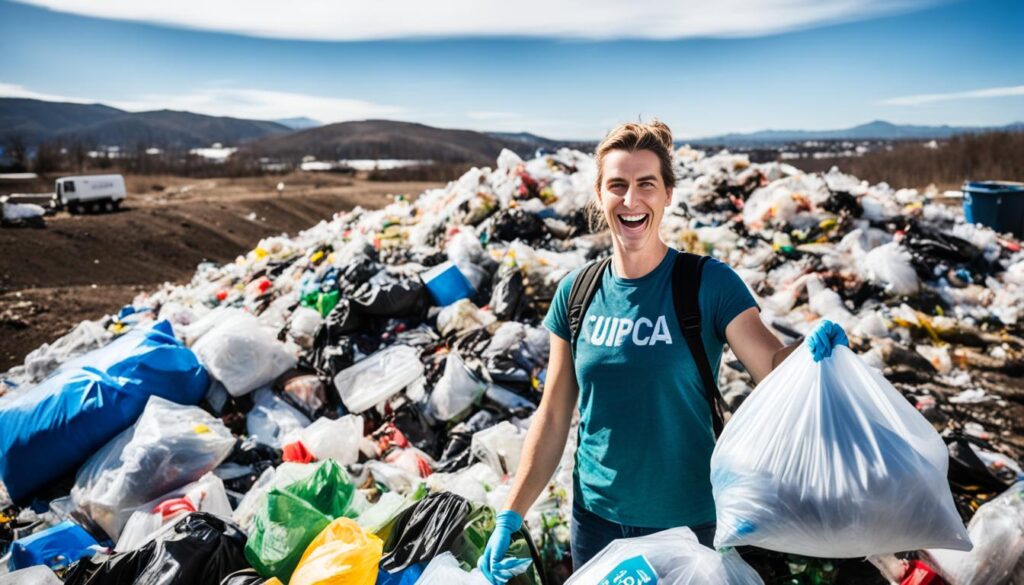
Dumpster Diving: Best Places to Dive
When it comes to finding the best places to dumpster dive, grocery shops and construction sites top the list. These locations offer excellent opportunities for dumpster divers to find valuable items and contribute to food waste reduction and waste management efforts.
Grocery Shops: A Gold Mine of Goodies
Grocery shops are known for discarding large quantities of perfectly good food, making them prime targets for dumpster diving. Many stores have strict expiration date policies and dispose of food items that are still safe to consume. By diving into the dumpsters behind grocery shops, dumpster divers can rescue edible items that would otherwise contribute to food waste.
Not only does dumpster diving at grocery shops reduce food waste, but it also provides an opportunity for individuals and families in need to find nourishing food. By salvaging these discarded items, dumpster divers can help alleviate food insecurity while contributing to a more sustainable food system.
Construction Sites: A Treasure Trove of Materials
Construction sites can be a treasure trove for dumpster divers looking for building and remodeling materials. Many construction companies discard usable items such as lumber, hardware, and fixtures that may no longer meet their project needs. By diving into dumpsters at construction sites, dumpster divers can find these materials and give them a second life, promoting waste reduction and the reuse of resources.
Furthermore, repurposing construction materials not only reduces waste but also minimizes the demand for new resources. This practice aligns with sustainability principles and supports the conservation of natural resources by giving discarded materials new purpose and value.
Summary: Best Places to Dumpster Dive
To summarize, grocery shops and construction sites are among the best places to go dumpster diving. Grocery shops offer an abundance of discarded but perfectly good food, tackling food waste and helping those in need. Meanwhile, construction sites provide opportunities to find valuable building materials that can be repurposed, contributing to waste reduction and sustainable practices.
Dumpster diving at these locations not only benefits individuals and communities but also plays a significant role in promoting food waste reduction and waste management strategies. Whether it’s rescuing edible items or salvaging usable materials, dumpster diving is an impactful way to contribute to a more sustainable and environmentally conscious society.
How Dumpster Diving Works
Dumpster diving is a fascinating process that involves sifting through dumpsters, garbage bins, and trash bags in search of usable or edible items. It may seem unconventional, but this practice plays a crucial role in salvaging perfectly good items and reducing waste. Many stores often discard extra goods and food, even if they are still in good condition, leading to unnecessary waste.
According to the dumpster diving process, divers carefully inspect different dumpsters to salvage items that can still be used or consumed. This could be anything from furniture, electronics, clothing, to perfectly edible food that is about to be thrown away.
By rescuing these items, dumpster divers give them a second chance and contribute to waste reduction. This process not only keeps usable items out of landfills but also helps to reduce food waste, as perfectly edible food is often discarded by grocery stores and other retailers. Dumpster diving is more than just rummaging through trash; it’s a practice that actively promotes sustainability and environmental conservation.
Despite initial negative perceptions, dumpster diving has proven to be a helpful way to combat waste and preserve valuable resources. It’s an opportunity to salvage usable items that could otherwise go to waste, reducing the strain on our planet’s limited resources.
Did you know?
Dumpster diving is not just about salvaging usable items—it also raises awareness about the alarming levels of waste we produce and the importance of reducing, reusing, and recycling.
Salvaging Usable Items
One of the primary goals of dumpster diving is to salvage usable items that are discarded prematurely. By rescuing these items, individuals can extend their lifespan and benefit from the items they find. This process promotes the reuse of materials and reduces the demand for new products, ultimately reducing the environmental impact caused by manufacturing and production.
Reducing Food Waste
Food waste is a significant issue globally, with tons of perfectly edible food being discarded daily. Dumpster divers play a crucial role in tackling this problem by rescuing edible food items that are still safe for consumption. By diverting this food from the landfill, dumpster divers contribute to hunger relief efforts and promote more sustainable food systems.
Dumpster Diving Process
The dumpster diving process typically involves the following steps:
- Identifying potential dumpster diving locations, such as grocery stores, restaurants, or residential areas.
- Gaining access by checking local regulations and ensuring it is legal and safe to dive in the chosen location.
- Timing is important—diving during business hours or after closing can increase the chances of finding usable items.
- Using gloves and proper protective gear for personal safety and hygiene.
- Inspecting and sorting through the dumpster contents, carefully looking for items of value.
- Rescuing and organizing the salvaged items, ensuring they are safely transported and properly utilized.
Avoiding Cross-Contamination and Food Safety Concerns
While dumpster diving for food, it’s crucial to prioritize food safety. By following these precautions, divers can ensure the food they salvage is safe to consume:
- Discard any food that shows signs of spoilage or has expired.
- Keep food items properly sealed and refrigerated to maintain freshness.
- Wash and sanitize reusable containers to prevent cross-contamination.
- Stay updated on safe handling techniques and guidelines to minimize health risks.
Dumpster Diving Laws and Legality
Dumpster diving is a unique activity that raises questions about its legality. Fortunately, dumpster diving is generally legal in all 50 states of the United States. In a landmark 1988 Supreme Court ruling, it was determined that dumpster diving is legal as long as it does not harm or violate any city, county, or state ordinances.
This ruling acknowledges that discarded trash is considered public property and can be inspected by law enforcement and other individuals without violating any laws. Dumpster diving falls under the legal principle known as “abandonment”, which means that once an item or material is discarded, the original owner relinquishes their rights to it.
However, it is crucial for dumpster divers to be aware of and comply with local regulations and ordinances. Trespassing on private property to access dumpsters or causing public disturbance while engaging in dumpster diving is not legal and can lead to legal consequences.
While dumpster diving is generally legal, it is important to approach the activity responsibly and ethically. Respecting property boundaries, avoiding noise disturbances, and leaving the area clean are essential practices that uphold the positive aspects of dumpster diving.
Remember, dumpster divers are not exempt from authorities’ inspection, and law enforcement can intervene if they suspect any illegal activities or violations. By understanding the legal boundaries and adhering to local regulations, dumpster divers can enjoy this activity while minimizing any legal risks.
What Do Dumpster Divers Do with Their Finds?
Dumpster divers have various options for what they can do with their finds. Many keep the items for personal use, utilizing them in their daily lives. Others may choose to sell the items through platforms like eBay or Facebook Marketplace, turning their dumpster diving haul into a source of income. Some divers opt to donate their finds to local food banks or charities, helping individuals in need. Upcycling is another popular choice, where divers repurpose discarded items into new products. Lastly, recyclable materials found through dumpster diving can be properly recycled, reducing waste and promoting environmental conservation.
Options for Dumpster Diving Finds
| Options | Description |
|---|---|
| Personal Use | Keep and use the items in daily life. |
| Selling Items | Sell the finds through online platforms for extra income. |
| Donations | Donate usable items to local food banks or charities. |
| Upcycling | Repurpose discarded items into new products. |
| Recycling | Properly dispose of recyclable materials to reduce waste. |
As the saying goes, one person’s trash is another person’s treasure. Dumpster divers embrace this mindset by finding value in discarded items, reducing waste, and taking part in sustainable practices. The choice of what to do with their finds is entirely up to the individual diver, and each option contributes to waste reduction and environmental conservation in its own way.

Conclusion
Dumpster diving is a valuable practice that has a significant impact on waste reduction and the promotion of sustainable practices. By rescuing usable items and food from dumpsters, this activity contributes to environmental conservation by reducing waste and helping to prevent landfill pollution. Not only does dumpster diving provide individuals with essential items, but it also plays a role in mitigating the impacts of poverty and hunger, benefiting both people and the planet.
Engaging in dumpster diving is a unique way to participate in waste management and make a positive environmental impact. By salvaging items that would otherwise be discarded, individuals who practice dumpster diving actively contribute to the preservation of resources and the reduction of waste. It is an effective strategy that aligns with the principles of the 3 Rs – reduce, reuse, and recycle – and fosters a more sustainable and responsible approach to consumption.
As we continue to grapple with the environmental challenges posed by excessive waste production, dumpster diving offers an accessible and effective solution. By incorporating sustainable practices like dumpster diving into everyday life, individuals have the power to make a meaningful difference in waste management and environmental conservation. Let us embrace the potential of dumpster diving and work towards a more sustainable future for ourselves and the generations to come.
Source Links
- https://blog.arcannwaste.com/why-dumpster-diving-is-good/
- https://discountdumpsterco.com/blog/dumpster-diving-and-scavenging/
- https://scholarship.claremont.edu/cgi/viewcontent.cgi?referer=&httpsredir=1&article=1058&context=pomona_theses

Subscribe to Our Newsletter


